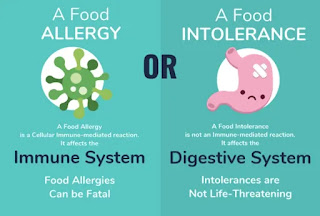Food Poisoning Allergies
Toxic Eating
Food poisoning can range in severity from mild and transient to more severe. Let's look at some ways to prevent it.
Food Poisoning: What Is It?
Consuming foods contaminated with pathogens like harmful bacteria or poisons is what causes food poisoning. We are surrounded by bacteria, so mild instances of food poisoning are frequent. Both diarrhea and stomach distress may result from these. When this occurs, you might hear your folks refer to it as a stomach virus or bug.
You might believe that eliminating all of the germs is the answer. However, even if it were feasible, you wouldn't want to do it. Bacteria are present everywhere, including in food, and occasionally they can be beneficial to us. You can learn how to keep bad bacteria out of your diet.
What Indicates Food Poisoning?
Symptoms of food poisoning include:
- a queasy tummy (called nausea, say: NAW-zee-uh)
- abdominal pain
- diarrhea (pronounce it: dye-uh-REE-uh), which could be bloody, and a temperature
Sometimes food poisoning symptoms appear hours after consuming the unhealthy food. Other instances, a person might not feel ill for a few days. You won't feel nauseated for very long if you have a mild case of food poisoning, and you'll soon feel normal again.
It can be challenging to distinguish between food illness and other conditions. Investigate a bit to see if anyone else experiences the same illness. Did they consume the same meal as you? Food poisoning might be the issue if the only individuals who consumed that food became ill.
Which Microbes Are at Fault?
Animal products, unwashed produce, and raw meals can all contain pathogens that result in food poisoning. Food from animals, such as meat, poultry, eggs, milk, and shellfish, is the most probable source (such as shrimp).
- Among the most prevalent microorganisms are:
- Salmonella (say: sal-meh-NEL-uh) (say: sal-meh-NEL-uh)
- Listeria (say: lis-TEER-ee-uh) (say: lis-TEER-ee-uh)
- Campylobacter (say: kam-pe-low-BAK-tur) (say: kam-pe-low-BAK-tur)
- E. coli (say: EE KOLE-eye)
People must correctly prepare, cook, and store their food in order to prevent food poisoning.
What Steps Will the Expert Take?
The doctor will query you extensively regarding how you're feeling, when you first started feeling ill, what you've eaten recently, and whether or not anyone else you know is also ill. To check for potential pathogens that could have caused food poisoning, the doctor may also collect a sample of your urine (pee) and stool (poop).
Depending on the type of germ giving you food poisoning, you'll receive a different course of therapy. Although the doctor might prescribe medication, most people with food poisoning don't require it.
Additionally, it is uncommon for a child with food illness to require hospitalization. Only those who become seriously exhausted typically need to visit the hospital. When you are dehydrated, your body has shed too much fluid from vomiting and diarrhea. In the hospital, a patient who is dehydrated can receive water and medication through an IV. When you're sick, attempt to continue consuming liquids to avoid becoming dehydrated.
If you have blood in your poop, you might also need to visit the doctor. Tell your guardians right away if you notice any blood in your feces.
How Can Food Contamination Be Avoided?
Food illness can be avoided in a variety of ways. Every step a meal goes through, from preparation to cooking to storing leftovers, should be done with these precautions. While adults bear the bulk of this duty, children can also contribute to the effort to combat germs. If you're assisting in food preparation, washing your hands is one of the finest precautions.
When ought one to wash? Before you begin assisting so that no germs from your hands end up on the food, and after so that you don't spread any food-borne illnesses to other people or yourself.
You can also keep your food secure by:
- Prior to consumption, wash fruits and veggies thoroughly.
- Eat only meals that have been cooked correctly. Tell a grownup if you cut into poultry and the inside appears pink and raw.
- Look and smell at the food you are consuming. Before consuming anything that appears or smells strange, make sure it is safe by consulting an adult. A excellent illustration is milk. You know you'd never want to experience sour milk again if you've ever had a sip. Another indication that food has deteriorated is mold, which can be green, pink, white, or brown in color.
- If you plan to consume leftovers, ask an adult to help you reheat them. Bacteria that developed while it was in the refrigerator can be eliminated by heating them.
- Verify the date. Many packaged goods have "sell by" or expiration dates (which means that the food should leave store shelves by that time). If today's date is past an item's expiration date, don't consume it. Before it ends, use it. To determine whether something has passed its sell-by date, consult an expert.
- Food should be immediately covered and chilled. Foods that are left at room temperature offer bacteria a good opportunity to thrive. You're chilling out those nasty germs by placing food in the refrigerator!

Posting Komentar untuk "Food Poisoning Allergies"